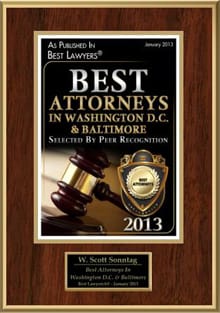Proving Your Case – Causation
The Law Offices of W. Scott Sonntag, P.A., serves medical malpractice plaintiffs in the D.C. metro area and Maryland counties including Prince George’s County, Montgomery County, Ann Arundel County, Howard County, Baltimore County, Baltimore City, St. Mary’s County, Charles County and Calvert County. Mr. Sonntag was named Trial Lawyer of the Year for 2006 by the Trial Lawyer’s Association of Metropolitan Washington, D.C.
Washington, D.C., metro area lawyer Scott Sonntag represents victims of medical malpractice in areas surrounding D.C., including Baltimore, Rockville, Annapolis, Columbia, Ellicott City, Waldorf, Prince Frederick and Salisbury. Mr. Sonntag’s emphasizes experienced counsel and caring service to distressed families.
To establish a case for medical malpractice, the plaintiff must prove that the defendant had a duty to the plaintiff, the plaintiff suffered an injury, and that the injury was caused by the doctor or other medical professional’s negligence. Proof of causation can be a particularly difficult issue in a medical malpractice case.
For one thing, the injuries generally involved in medical malpractice cases require specific medical training to understand, and the normal plaintiff may not know the cause of such injuries. In addition, injuries could be exacerbated by the underlying condition(s) for which plaintiff was seeking treatment, so it can be hard to tell the true extent that the negligence itself resulted in harm. It is important to contact an experienced medical malpractice attorney at Law Offices of W. Scott Sonntag, P.A. in Columbia, Maryland, who can evaluate your case and work with experts to prove causation.
Preponderance of the evidence standard
The burden is on a medical malpractice plaintiff to establish, by a preponderance of the evidence, that the defendant’s actions or omissions were the cause of the plaintiff’s injury. In laymen’s terms, this means that the plaintiff must prove that it was more likely than not that the defendant’s actions caused the plaintiff’s injury. This may be especially hard to do in cases where the plaintiff alleges that the injury hr or she suffered is one that could be the expected result of the original disease or condition; that is, where the plaintiff is basically alleging a failure to cure.
Types of causation
There are two types of causation: actual cause (“cause-in-fact”) and proximate cause. The defendant’s actions are the “cause-in-fact” of the plaintiff’s injury if the plaintiff would not have been injured “but for” the defendant’s wrongful act, or if the plaintiff’s injury was a foreseeable result of the defendant’s actions. Proximate cause deals with the issue of whether, considering all other relevant factors, the defendant’s actions were the legal cause of the plaintiff’s injury.
A defendant will often try to demonstrate that there are other possible causes for the plaintiff’s injury. One such possible cause is the plaintiff’s preexisting underlying condition, that is, the plaintiff’s original illness or injury for which he or she sought medical treatment. In addition, the defendant may try to show that the plaintiff was negligent in some way, and that it was this negligence, and not the health care provider’s, that actually caused the plaintiff’s injury.
The health care provider may also argue that even if he or she deviated from acceptable medical protocols, such a deviation would not have altered the outcome for the plaintiff. Further, the health care provider could argue that there was a “superseding” or “intervening” cause that serves to shift liability to a third party. This line of argument supposed that the third party’s actions caused a new, independent and unforeseen harm that superseded any actions of the defendant.
The importance of expert testimony
Because of the complexity of the subject matter of medical malpractice cases, it is generally expected that the plaintiff must rely on expert testimony to support their claim, particularly when it comes to the element of causation. Most medical issues are not within the common knowledge of the plaintiff or a jury, so an expert’s testimony can be critical in helping the jury understand the applicable standard of care, whether the defendant provider failed to meet that standard, causation and damages.
Medical malpractice cases often come down to a so-called “battle of the experts” between the plaintiff and the defense, with expert witnesses from both sides offering opinions on the defendant’s actions, whether they were in line with the standard of care and whether the defendant caused the plaintiff’s injuries, as well as the impact of the plaintiff’s underlying condition. In some cases, such as where the result of the medical treatment or surgery is so obvious that a layperson can understand it, an expert may not be necessary.
“The thing speaks for itself”
If a patient is injured following a medical procedure, and cannot distinguish precisely what caused the injury, but knows that such an injury would not have occurred without negligence, the plaintiff might be able to invoke the legal doctrine of res ipsa loquitur. This is a Latin phrase which means “the thing speaks for itself.” Res ipsa loquitor implies that the plaintiff need only show that a particular result occurred, and it would not have happened but for the defendant’s negligence.
A classic example of the type of case in which res ipsa loquitur arises is one in which a medical instrument is left inside a person following surgery. It is obvious even to someone with no medical training that instruments should not be left behind after surgery, and that such an event would not have occurred in the absence of negligence.
To successfully invoke res ipsa loquitur, the plaintiff must show that:
- There is no evidence of the precise cause of the injury
- The injury is not the kind that ordinarily occurs in the absence of negligence
- The plaintiff was not responsible for his or her own injury
- The defendant, or its employees or agents, had exclusive control over the instrumentality that caused the injury
- The injury could not have been caused by any instrumentality other than that over which the defendant had total control
Contact a medical malpractice lawyer
Issues of causation can be some of the most difficult issues to prove in a medical malpractice case. Because of this, expert testimony is often required. An experienced medical malpractice lawyer at Law Offices of W. Scott Sonntag, P.A. in Columbia, Maryland, can gather the necessary documentation and medical records, and work with experts to build a case for malpractice.
DISCLAIMER: This site and any information contained herein are intended for informational purposes only and should not be construed as legal advice. Seek competent legal counsel for advice on any legal matter.





